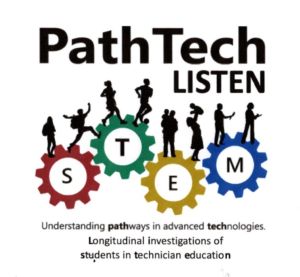
Researchers conducting PathTech LISTEN (NSF #1801163) interviews have found that most of those who completed technician education programs are “extremely pleased” with the education they received and have found their training to be “100%” relevant to their jobs.
The PathTech LISTEN project is a mixed methods, longitudinal investigation of post-college experiences of alumni from AS/AAS degree, certificate, and license programs. It grew out of PathTech LIFE: A National Survey of LIFE (Learning, Interests, Family, and Employment) Experiences Influencing Pathways into Advanced Technologies (#1501999). Will Tyson, associate professor of sociology at the University of South Florida, is the principal investigator (PI) of both of these Advanced Technological Education (ATE) targeted research projects. The Florida Advanced Technological Education Center (FLATE) is a PathTech partner.
More “early findings” from PathTech LISTEN will be shared at the 2020 ATE Principal Investigators Conference. The theme of this year’s conference is Innovation and Impact: ATE for the Future. The significant role that ATE projects and centers play in creating and implementing successful career pathways will be the focus of most sessions. For more information visit the American Association of Community Colleges (AACC)'s ATE PI Conference pages.
During the PathTech Listen session at 10 a.m., on October 24, Tyson hopes to generate discussions with ATE principal investigators that will lead to them staying in touch with the researchers and using PathTech findings.
During a phone interview for the ATE Impacts Blog, Tyson and Lakshmi Jayaram, co-principal investigator of the PathTech projects, pointed out that these early results based on 94 interviews conducted between June 1 and September 30, 2019, are just the first phase of the LISTEN longitudinal study that aims to follow the careers of 100 to 120 students.
The alumni who participated in the 40-to-60-minute phone interviews for the LISTEN project will be interviewed again in 2020 and then be asked to complete a survey in 2021.
“We’re going to use this experience of interviewing everyone not only to more deeply understand everyone’s experience, but also to help us identify the important questions to ask and put in a survey that we can continue in a longitudinal way,” Jayaram said. Such a longitudinal study would provide information about technicians akin to that gathered for the Baccalaureate and Beyond Longitudinal Study.
“We think it is an important group to follow because this is the direction our workforce is expanding in, and these are the good jobs of the future. So really understanding how people get into to these jobs, and stay in these fields and grow in these fields and grow the workforce is really a relevant topic,” she said.
The LISTEN interviewees were selected by the researchers from among the 3,216 students at 96 two-year colleges who participated in the PathTech LIFE survey in 2017 and 2018. All of the survey participants were enrolled at the time of the survey in engineering technology, advanced manufacturing, micro- and nanotechnology, or energy and environmental technology programs.
Fifty-five of the 96 colleges were ATE grantees and had 2,118 students participate in the LIFE survey. Twenty-four of the colleges were ATE partners and 626 of their students provided survey responses. Seventeen colleges where 472 students participated in the survey were not affiliated with the ATE program. Students were each paid $25 for taking the 15-minute survey. Colleges with 75% response rate received $250. The 40 colleges with a 50% or higher response rate received reports about their college’s data in addition to the final, national report that Tyson and his colleagues are in the process of finalizing this fall.
The two reasons that the 3,216 PathTech LIFE survey participants cited most often for enrolling in advanced technology programs were to increase opportunities for a better life and to expand their knowledge.
- 52% had children in their households.
- 58% had never enrolled in college before.
- 55% were “extremely committed” to their field of study.
Insights for Learning from Graduates
Tyson said that he was happily surprised that 74% of the LIFE survey respondents provided non-college email addresses and indicated that they would be willing to participate in a follow-up study, which became the LISTEN project.
A report on best practices for learning about program outcomes from students is another deliverable that the researchers are working on with Marilyn Barger, a co-PI of the research projects and principal investigator of FLATE.
Tyson said that he thinks including the college name in the subject line of the email invitation sent to the individuals selected for the LISTEN project facilitated its high response rate. To learn more about the experiences of populations that have been underrepresented in STEM fields the researchers explained that they “oversampled” from the LIFE survey participant pool for people in the groups of interest including women, racial and ethnic minorities, veterans, and individuals with disabilities.
“It’s a complex, busy, busy life,” Tyson said, referring to alumni and the challenges educators often encounter when trying to obtain post-program feedback. He hopes the discussion at the ATE PI conference will be an opportunity for PIs to share what they have found to be effective practices for learning about their former students’ careers.

 Subscribe
Subscribe


 See More ATE Impacts
See More ATE Impacts

Comments
There are no comments yet for this entry. Please Log In to post one.